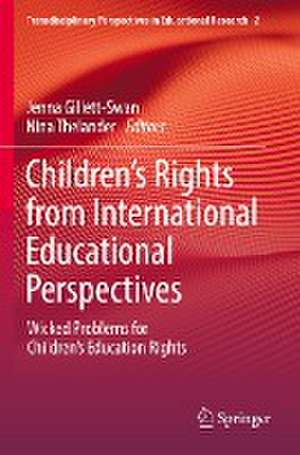Children’s Rights from International Educational Perspectives: Wicked Problems for Children’s Education Rights: Transdisciplinary Perspectives in Educational Research, cartea 2
Editat de Jenna Gillett-Swan, Nina Thelanderen Limba Engleză Paperback – 3 dec 2022
| Toate formatele și edițiile | Preț | Express |
|---|---|---|
| Paperback (1) | 526.35 lei 6-8 săpt. | |
| Springer International Publishing – 3 dec 2022 | 526.35 lei 6-8 săpt. | |
| Hardback (1) | 701.90 lei 6-8 săpt. | |
| Springer International Publishing – 2 dec 2021 | 701.90 lei 6-8 săpt. |
Preț: 526.35 lei
Preț vechi: 619.24 lei
-15% Nou
Puncte Express: 790
Preț estimativ în valută:
100.71€ • 105.16$ • 83.36£
100.71€ • 105.16$ • 83.36£
Carte tipărită la comandă
Livrare economică 04-18 aprilie
Preluare comenzi: 021 569.72.76
Specificații
ISBN-13: 9783030808631
ISBN-10: 3030808637
Pagini: 254
Ilustrații: XV, 254 p. 1 illus.
Dimensiuni: 155 x 235 x 18 mm
Greutate: 0.39 kg
Ediția:1st ed. 2021
Editura: Springer International Publishing
Colecția Springer
Seria Transdisciplinary Perspectives in Educational Research
Locul publicării:Cham, Switzerland
ISBN-10: 3030808637
Pagini: 254
Ilustrații: XV, 254 p. 1 illus.
Dimensiuni: 155 x 235 x 18 mm
Greutate: 0.39 kg
Ediția:1st ed. 2021
Editura: Springer International Publishing
Colecția Springer
Seria Transdisciplinary Perspectives in Educational Research
Locul publicării:Cham, Switzerland
Cuprins
Chapter 1. Setting the scene for children’s rights and education: understanding the aims of education.- Chapter 2. Article 29 and its translation into policy and practice in scotland: an impossible right to education?.- Chapter 3. teaching and learning together”: one model of rights-centred secondary teacher preparation in the United States.- Chapter 4. The educational rights of children with disability in Australia.- Chapter 5. Children’s educational rights in Poland: policy, school realities and ideological tensions.- Chapter 6. Children’s education: from a right to a capability.- Chapter 7. It takes a village to overcome school failure and dropout: innovative educational practices promoting children’s educational rights in Portugal.- Chapter 8. The education of first nations children in Australian educational contexts: some children are more equal than others.- Chapter 9. Ability-grouping and rights-based education in the neoliberal era: an irresolvable combination?.- Chapter 10. Participation and social exclusion – are they mutually exclusive phenomena?.- Chapter 11. Education rights and the convergence of provision and participation.- Chapter 12. Small voices bring big messages. Experiences of student voice and inclusion in Spanish schools.- Chapter 13. Inclusive and exclusionary practices concerning a child’s voice in preschool: the perspective of polish student teachers’ experiences.- Chapter 14. How to recognise and support participation in schools — critical considerations.- Chapter 15.- Children’s human rights and intercultural education: curricular prescriptions and teachers’ practices in Switzerland.- Chapter 16. Countering scepticism and mistrust towards children’s rights within education: fulfilling article 29 in Mexico through teachers’ training on human rights.- Chapter 17. Perspectivising children’s rights and education in research: analysing the teaching and learning of children’s rights on the basis of human rights education (hre) theory.- Chapter 18. Child rights knowledge and children’s education rights.
Notă biografică
JENNA GILLETT-SWAN, PhD. is an Associate Professor and Researcher at the Queensland University of Technology, Australia. Her research has a social justice orientation and focuses on wellbeing, rights, voice, and educational participation. She also specialises in qualitative child-centred participatory research methodologies.
NINA THELANDER, PhD. is a senior lecturer and researcher in educational work at Karlstad University, Sweden. Her main research interest concerns children’s rights in education in various international educational contexts. Another research focus is on teaching and learning human rights, democracy and teacher education.
NINA THELANDER, PhD. is a senior lecturer and researcher in educational work at Karlstad University, Sweden. Her main research interest concerns children’s rights in education in various international educational contexts. Another research focus is on teaching and learning human rights, democracy and teacher education.
Textul de pe ultima copertă
Chapter 10 is available open access under a Creative Commons Attribution 4.0 International License via link.springer.com.
Caracteristici
Offers diverse international perspectives on children’s rights with educational application Raises critical perspectives on children’s rights in, to and through education Makes rights for children more accessible and understandable Provides practical examples for implementation






